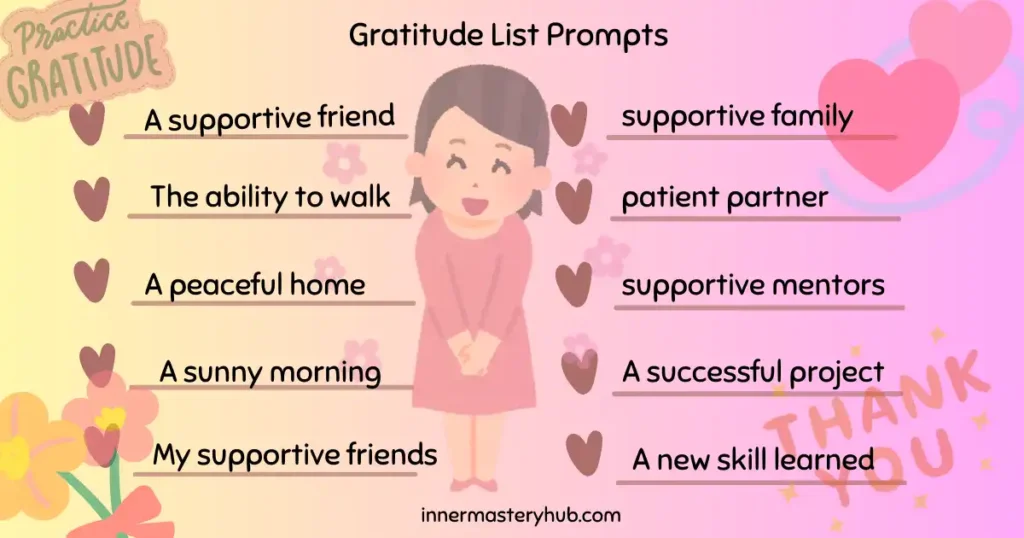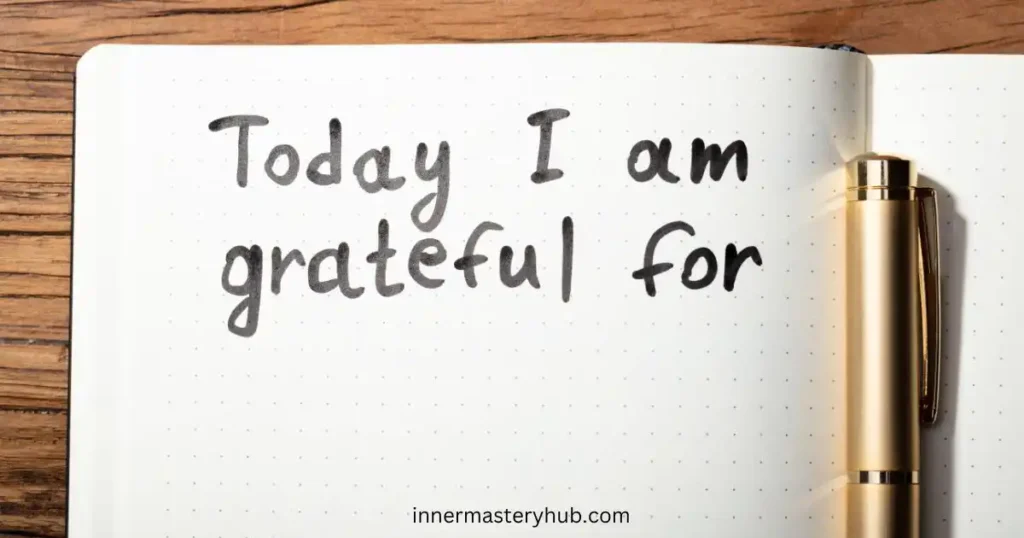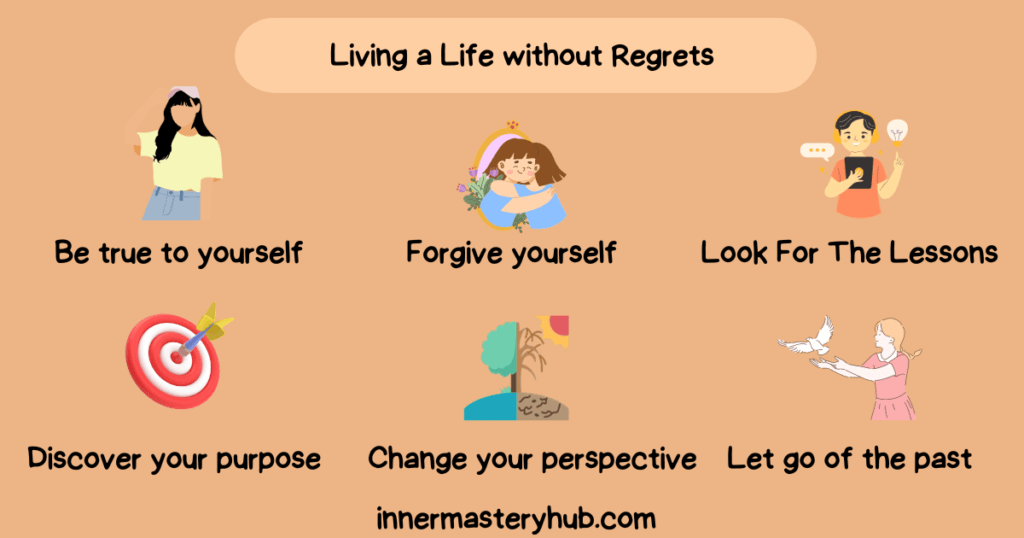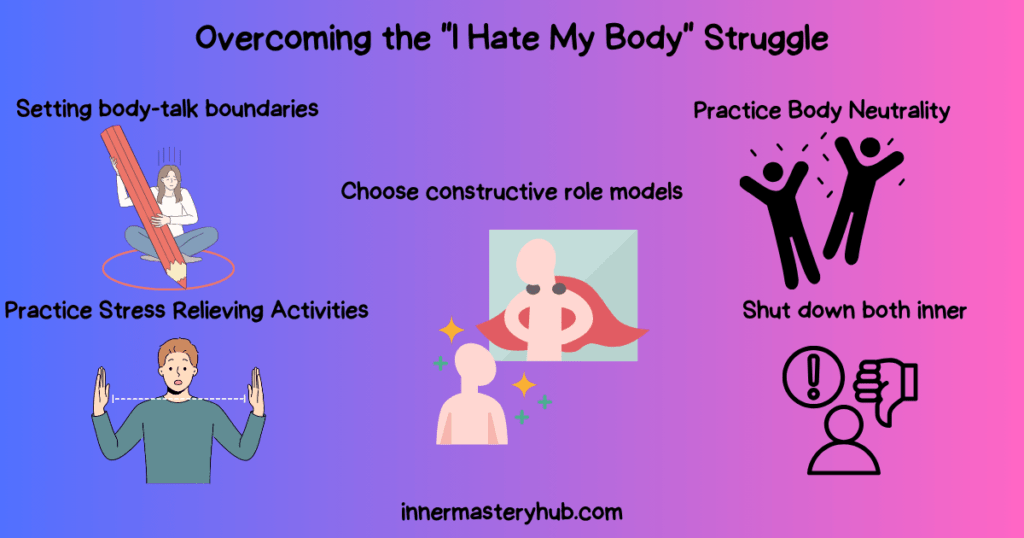200+ Epic Gratitude List Ideas for Tough Times

A gratitude list is a personal collection of things, people, experiences, or moments that you are thankful for. It’s a simple but intentional practice of writing down what brings you happiness and joy. A gratitude list helps to shift your focus away from negativity and stressful life towards positive mental health and emotional well-being. This can range from small daily occurrences, like enjoying a cup of coffee, to bigger life events, such as personal achievements or having meaningful relationships.
What Is a Gratitude List?
A gratitude list is just a list of things you’re thankful for. It’s as simple as writing down things like a good meal, a friend who helped you, or even something small like a nice walk outside.
The idea is to help you focus on the good stuff in your life instead of the negatives. When you do this regularly, it makes you feel happier and content. To create your gratitude list, set aside a few minutes each day to think about what you’re thankful for. Grab a notebook or gratitude journal, use your phone, and write down a few things that made you feel good about yourself.
It could be something small, like enjoying a hot cup of coffee, or something bigger, like spending time with family or finishing a project.
Why You Should Make a Gratitude List?
You should make a daily gratitude list because it has been proven to have powerful benefits for your mental and emotional well-being.
Research in psychology shows that regularly practising gratitude can improve sleep, self-esteem, and reduce symptoms of depression and anxiety. For example, a study published in the Journal of Personality and Social Psychology found that people who wrote weekly gratitude lists reported feeling more optimistic and had fewer physical complaints than those who focused on daily hassles.
Another real-life case study by psychologist Dr Robert Emmons, a leading researcher on gratitude, involved groups of participants who kept gratitude journals over 10 weeks. Those who consistently wrote about things they were grateful for reported better moods, more energy, and greater life satisfaction compared to a control group that focused on neutral life events. Additionally, the gratitude group even exercised more regularly and experienced fewer health issues.
How to write your gratitude list?
Writing your gratitude list is simple and can be done in just a few steps:
1. Find a Comfortable Spot. Choose a quiet place where you can relax and focus without distractions.
2. Pick a suitable Time, and set aside a few minutes each day or week to work on your gratitude list. It can be in the morning to start your day positively or in the evening to reflect on the day.
3. Use a Notebook or App, or you can write in a physical notebook, use a note-taking app on your phone, or even type on your computer, whatever works best for you.
4. Start with the basics; write down a few things you’re thankful for. They can be big, like a supportive friend, or small, like a delicious meal.
5. Be Specific; instead of general statements, try to be specific about what you’re thankful for and why. For example, instead of writing “I’m grateful for my friends,” you might write “I’m grateful for my friend Sarah, who listened to me vent about my stressful day.”
6. Reflect on the positive; as you write, think about how these things or people have positively impacted your life. This helps deepen your sense of gratitude.
7. Try to make this a consistent, regular habit. It could be daily, weekly, or whatever frequency feels right for you.
8. Occasionally review and reflect on your list to see how your perspective has changed over time. Reflect on past entries to appreciate how far you’ve come.
With regular gratitude practice, you can create a meaningful gratitude list that helps you focus on the positive aspects of your life and enhances your overall well-being.
200 + Your Gratitude List Ideas
Write in your gratitude about anything you are thankful for in your life. Here are some ideas to get you started:
A Simple Daily Gratitude List
- A warm cup of coffee
- A sunny morning
- A healthy breakfast
- A supportive friend
- The ability to walk
- A comfortable bed
- A peaceful home
- Running water
- Electricity
- Good health
Gratitude List Ideas Focused on Relationships
- loving family
- supportive friends
- patient partner
- understanding colleagues
- helpful neighbors
- supportive mentors
- caring teachers
- loyal pets
- friendly acquaintances
- supportive community
A List Focused on Experiences
- A beautiful sunset
- A fun day out with friends
- A delicious meal
- A successful project
- A positive memory
- A peaceful moment in nature
- A sense of accomplishment
- A new skill learned
- A personal growth experience
- A moment of connection with others

A Gratitude List Ideas for Health and Wellness
- Good health
- The ability to learn
- A strong body
- The gift of life
- The opportunity to help others
- The ability to heal and recover
- The strength to overcome challenges
- The resilience to bounce back
- The ability to find joy in everyday moments
- The opportunity to live a fulfilling life
A Gratitude List Ideas Focused on Intangibles
- Love
- Hope
- Compassion
- Kindness
- Forgiveness
- Patience
- Gratitude
- Joy
- Peace
- Faith
A List of Personal Values and Beliefs
- Honesty
- Integrity
- Kindness
- Respect
- Compassion
- Gratitude
- Courage
- Perseverance
- Equality
- Justice
Close friends
- Unconditional support and love
- Shared experiences and laughter
- A deep sense of trust and understanding
- A safe space to be yourself
- A reliable source of advice and encouragement
Kindness of strangers
- Acts of compassion and generosity
- A reminder of the goodness in humanity
- A sense of connection and belonging
- A boost to your mood and well-being
- A feeling of inspiration and motivation
Love and companionship of a partner
- A deep emotional bond and connection
- A sense of belonging and support
- Shared goals and aspirations
- A source of comfort and happiness
- A lifelong commitment and partnership
Meeting new people
- Expanding your social circle
- Learning new perspectives and ideas
- Discovering shared interests and hobbies
- Making new friends and connections
- Feeling more connected to your community
Helping others
- A sense of purpose and fulfilment
- A positive impact on the world
- A feeling of connection and belonging
- A boost to your self-esteem
- A reminder of the importance of giving back
Doing something kind for someone
- A feeling of happiness and satisfaction
- A positive impact on the recipient’s life
- A stronger connection with others
- A boost to your mood and well-being
- A reminder of the power of kindness
Nature and the Environment
- A beautiful sunrise or sunset
- The fresh air and clean water
- The diverse wildlife and ecosystems
- The beauty of the trees and plants
- The peaceful sounds of nature
- The opportunity to hike, camp, or explore the outdoors
- The ability to connect with nature and find peace
- The beauty of the seasons and the changing landscape
- The opportunity to learn about environmental conservation
- The ability to contribute to environmental protection
Health and Well-being Gratitude List Ideas
Here are some ideas for a gratitude list focused on health and well-being:
- Good health
- A strong body
- A healthy mind
- Sufficient sleep
- Nourishing food
- Access to healthcare
- The ability to learn and grow
- The strength to overcome challenges
- The ability to find joy and happiness
- The opportunity to live a fulfilling life
Health and Wellness
Here are some examples of gratitude items related to health and wellness:
Physical Health
- A strong body that allows me to move freely and enjoy activities.
- The ability to sleep soundly and wake up feeling refreshed.
- The ability to eat nutritious food and maintain a healthy weight.
- The strength to overcome physical challenges and setbacks.
- The ability to heal and recover from injuries or illnesses.
Mental Health
- A clear and focused mind.
- The ability to manage stress and anxiety effectively.
- A positive outlook on life and a sense of hope.
- The ability to find joy and happiness in everyday moments.
- The strength to overcome negative thoughts and feelings.
Emotional Health
- The ability to express and manage emotions healthily.
- Strong and supportive relationships with loved ones.
- The ability to find peace and contentment.
- The resilience to cope with challenges and setbacks.
- The ability to forgive and let go of negative emotions.
Social Health
- A strong support network of friends and family.
- The ability to connect with others and build meaningful relationships.
- The opportunity to contribute to my community and make a positive impact.
- The ability to find belonging and acceptance.
- The opportunity to learn from others and grow as a person
Freedom and Rights
- The right to free speech
- The right to vote
- The right to a fair trial
- The right to education
- The right to work
- The right to freedom of religion
- The right to privacy
- The right to assembly
- The right to freedom of movement
- The right to be free from discrimination
When do you need Gratitude List Ideas?
Here are some times when it’s particularly beneficial to use a gratitude list:
- When you’re feeling stressed or overwhelmed, focusing on the positive things in your life can help reduce stress and improve your mood.
- When you’re facing challenges, gratitude can help you find perspective and resilience during difficult times.
- When you want to improve your relationships, expressing gratitude to others can strengthen your bonds and make them feel appreciated.
- When you’re looking for a boost of happiness, gratitude can help you cultivate a more positive mindset and experience greater joy.
- When you want to develop a more mindful and present mindset, focusing on the present moment and appreciating what you have can help you become more mindful.
- When you want to improve your sleep. Thinking about positive things before bed can help you relax and get a better night’s sleep.
- When you want to increase your self-esteem, recognising your accomplishments and the good things in your life can boost your self-confidence.
Ultimately, the best time to use a gratitude list is whenever you feel it will benefit you. It can be a powerful tool for improving your mental health and overall well-being.
Gratitude List Benefits
- Shifting focus. Concentrate on positive aspects of life to divert your attention away from stressors and reduce the emotional impact they have on you.
- Mindful awareness. Gratitude practices develop mindfulness, which allows you to be more present in the moment and less preoccupied with anxieties.
- Positive emotions. A gratitude mindset increases positive emotions like joy, contentment, and peace, which counteract the negative emotions associated with stress and anxiety.
- Reduced cortisol levels. Studies have shown that gratitude practices can decrease cortisol levels, a hormone associated with stress.
- Improved coping mechanisms. Gratitude can help you develop healthier coping mechanisms for dealing with stress, such as relaxation techniques or mindfulness.
- Increased self-confidence. Recognise your accomplishments to boost your self-esteem and confidence.
- Reduced self-criticism. Gratitude helps to shift your focus away from negative self-talk and toward your strengths and positive qualities.
- Improved self-acceptance. Acknowledging and appreciating yourself can lead to greater self-acceptance and self-love.
- Increased focus and concentration. Practising gratitude can help improve your focus and concentration, allowing you to be more present in the moment.
- Reduced rumination. Gratitude can help reduce rumination, which is the tendency to dwell on negative thoughts and feelings.
- Increased appreciation for life. Gratitude can help you appreciate the simple joys and beauty of life.
FAQS About Gratitude List Ideas
What is a gratitude list?
A gratitude list is a simple practice where you write down things you’re thankful for, like family, health, or a warm meal. It shifts your mindset to positivity, reduces stress, and increases happiness. Start with 3-5 items daily; no need for perfection—just sincerity.
Why should I make a gratitude list?
It rewires your brain to focus on positives, lowering anxiety and improving mood. Studies show regular practice improves sleep and relationships. It’s free, quick, and empowers you during tough times. Try it mornings or evenings for lasting emotional benefits.
How do I start a gratitude list?
Grab a notebook or app. Set aside 5 minutes daily. Jot down specific things, like “the laughter of my kids” instead of “family.” Follow consistently, aim for 3 entries. Over time, it becomes a habit that brightens your outlook effortlessly.
What are some ideas for beginners?
List basics: a cosy bed, fresh coffee, supportive friends. Nature ideas: sunny walks, blooming flowers. Personal: a skill you have, a memory that warms you. Keep it real, small joys count most, and build momentum for deeper reflections.
How often should I write in my list?
Daily is ideal for habit-building, but even 3 times a week works. Mornings set a positive tone; evenings promote restful sleep. Adjust to your life; consistency matters more than frequency. Track progress to see mood improvements over weeks.
Can I do it digitally?
Yes! Use apps like Day One or Gratitude Journal for easy tracking with reminders. Phone notes work too. Digital lists let you add photos or voice memos. It’s convenient for busy lives, ensuring you never miss a thankful moment.
What if I can’t think of anything?
Start small: your breath, a roof overhead, or hot water. On tough days, recall past gratitudes. Prompt yourself with “What made me smile today?” It gets easier, practice reveals hidden blessings, turning a scarcity mindset into abundance.
Does it help with mental health?
Absolutely, research in psychology shows it combats depression by increasing dopamine. It builds resilience, reducing negative rumination. Pair with therapy for best results. Even short lists during stress can calm your mind and spark joy.
How can I make it more creative?
Theme it: “Gratitude for senses” (tasty food, soft music). Draw doodles or pair with photos. Share anonymously online or with a friend. Vary prompts like “Unexpected gifts” to keep it fresh and deeply engaging.
What are the long-term benefits?
Over months, it builds optimism, stronger bonds, and better coping skills. You’ll notice more positives in life, leading to fulfilment. It transforms perspective, from “what’s wrong” to “what’s right.” Sustainable happiness follows consistent, heartfelt practice.






